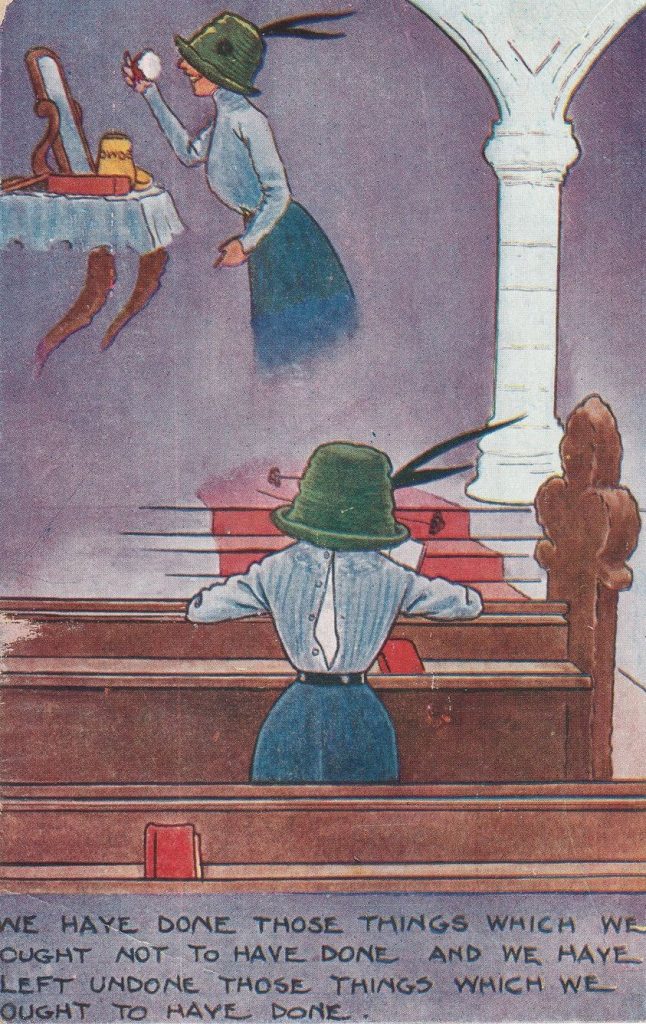This ethereal postcard image comes from the Bob and Dear P cards that date from 1913-1914.

This time we find “P” with an injured knee and Bob short of things to write about.
There is no artist credit, so we cannot do more than assume the imaginative and charming artwork was that of a house artist at the publisher, E. Mack.
The illustration is a bit of a storyboard. The upper portion shows a young lady preparing herself for her day. She is tidily – if not modestly – dressed and appears to be applying some powder to soften the glow from her face. The other image in the story suggests that the lady’s destination was her church. Going to church may have factored into her selection of modest attire, although in her haste she has forgotten to fasten the buttons of her blouse.
The card is titled, We have done those things which we ought not to have done and have left undone those things which we ought to have done. At best it is a cumbersome phrase, but it is not unique to this card. There are other postcards with the same phrase and similar illustrations.
When first read the title seemed to be a direct reference to the open blouse only (“have left undone those things which we ought to have done”), but a second look seems to suggest it is a sanctimonious comment on the application of makeup (“We have done those things which we ought not to have done”). The card is mildly humorous, but it could also be a statement of the morals of the time.
What was unknown before researching the phrase was that the title predates the card by half a century. The title is from the Book of Common Prayer of 1863, and possibly predates the date of publication.
The full prayer is as follows: ALMIGHTY and most merciful Father; We have erred and strayed from thy ways like lost sheep. We have followed, too much, the devices and desires of our own hearts. We have offended against thy holy laws. We have left undone those things which we ought to have done; And we have done those things which we ought not to have done; And there is no health in us. But thou O Lord have mercy upon us, miserable offenders Spare thou those, O God, who confess their faults. Restore thou those who are penitent; According to thy promises declared unto mankind in Christ Jesus our Lord. And grant, O most merciful Father, for his sake; That we may hereafter live a godly, righteous, and sober life, To the glory of thy holy Name. Amen.
Most of us are very much, “live and let live” people and we try hard to respect the beliefs of others, although the above prayer appears to be from a time when God was to be feared and worshipers thought themselves unworthy.
The card was not mailed although is dated September 19, 1914. It reads as follows: My Dear P, I was awfully sorry to hear about your knee. Do hope you will get better soon. I had to go to the Dr. last night. My cold was lots worse & I felt rotten altogether (& still do). Of course, if you are ill, I must be in the fashion. How have you hurt your knee did you do it with Hockey last winter “or what” (most likely “or what” I suppose). You should really be more careful. Your remark, Be good & if not be careful was most uncalled for. I am always most careful, this is I mean to say, good that careful was a slip of the pen. I must close now. Hoping to see you soon. If you are ill, I am sure I shall pine away to a shadow. Kindest regards to Cheerful.
Love to you always,
Bob.
Please excuse this P.C. I could not write enough to fill a letter.”
**
Through this thread of correspondence by which we have come to know Bob and Phyllis, it is still difficult to ‘like’ Bob. He seems so very “straightlaced.” The phrase “If you can’t be good, be careful” is still popularly used and tends to have a sexual innuendo. It is frequently heard between friends (and usually accompanied by a knowing wink), yet Bob appears to think it was inappropriate and tries to make light of it. His concern for Phyllis’s knee appears genuine although his remark, “I am sure I shall pine away to a shadow” causes a cringe. Perhaps criticizing Bob is too harsh and we should remember that Phyllis was a teenager at the time and Bob was likely of a similar age.
Confused? A little, but how often do we say, “Confusion is the result of reading dead people’s mail?”
Since the first documented game of women’s ice hockey was in 1892, only about twenty years before Bob wrote the quoted message, I’d guess that either “P” was a pioneer player or the notion of her participating in the game was intended as a joke by Bob.
As the card was mailed in the UK, I suspect the reference to ‘hockey’ to relate to the far more sedate game of women’s field hockey which is played on grass. That said, the term sedate is a bit tongue in cheek as at High School I played men’s field hockey and the most voilent and physical game in which I played was when the opposition was the women / girl team!!
You will never believe the apro po happening here as this card was read. I picked up the phone and it was probably a boiler room call. I will just stop there, and you can imagine what you like, once more.Scuse spelling